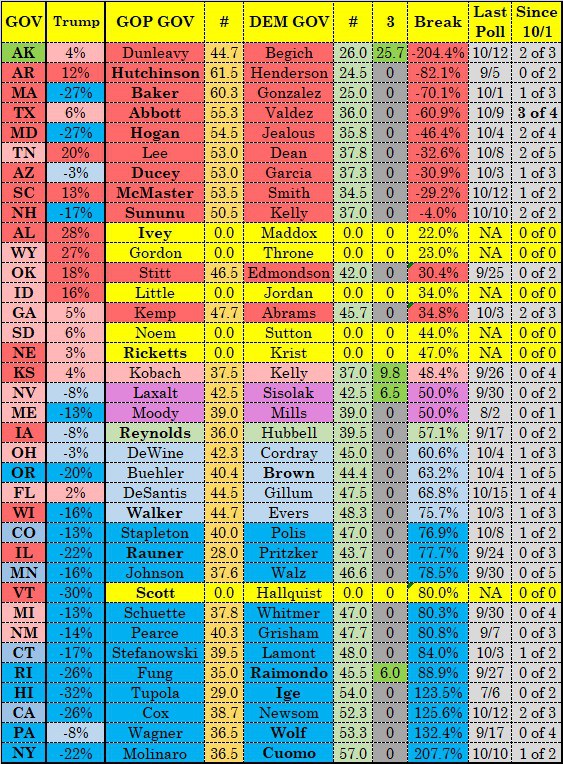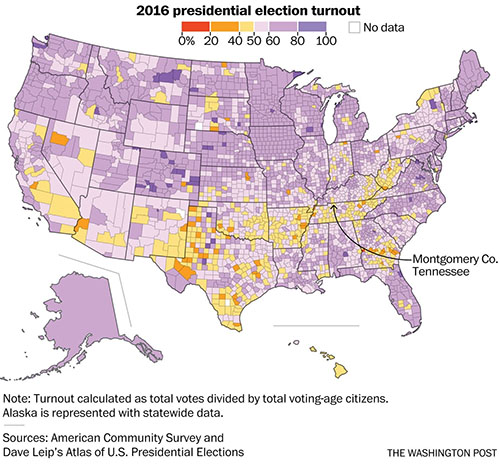New Senate: DEM 48 GOP 52
New polls: CA FL IN ND VT WV
Dem pickups: AZ
GOP pickups: MO ND
Previous | Next
Trump Says U.S. Will Increase Nuclear Stockpile
This weekend, Donald Trump announced that the United States will withdraw from the 1987 Intermediate-Range Nuclear Forces (INF) treaty, one of the signature achievements of the Reagan presidency, because the Russians have been violating the terms of the treaty. This seems a little like dealing with drivers who speed by repealing the speed limit, but there it is. On Monday, Trump went even further, and declared that the United States would be developing more nuclear weapons, so as to put pressure on Russia and on China.
On a tactical level, this makes very little sense, for at least three reasons. The first is the old Cold War-era doctrine of mutually assured destruction. It's not usually called that anymore, but the basic notion still holds. Any attack by the United States against China or Russia is guaranteed to generate an equally devastating response from either (or both) of those nations. There is no amount of strategic brilliance, or pinpoint accuracy, or catching the enemy by surprise that can change that fact, at least in part because each nation has submarines armed with nuclear warheads that would counterstrike even if all land-based weapons were incapacitated.
The second issue is that, even if nuclear war is going to happen, the United States already has all the nuclear weapons it could possibly use. It's estimated that it would require the detonation of just 100 warheads to initiate a nuclear winter that would black out the sun and end all life on Earth. The U.S. has roughly 2,000 weapons available for service right now, including roughly 600 of the sort covered by the INF treaty. That's more than enough to, you know, wreck the whole planet.
And finally, even if the U.S. feels that destroying all life on Earth just one time is not enough, and that we need to be able to do it five, or ten, or twenty times, there is no need to build more nuclear weapons. America already has a couple thousand bombs that are inactive, and another couple thousand that are waiting to be dismantled. All that is necessary to expand the stockpile would be to activate or re-commission some of those weapons.
So, there's no tactical purpose here. But maybe the goal is to intimidate the Russians and/or the Chinese, and to get them quaking in their boots? Can't be. The problem is that they already know all of the things in the preceding paragraphs, and so they know that if the U.S. adds 10 or 100 or 10,000 nukes to its capacity, it doesn't really change much of anything. Whatever the danger level is, it's basically the same no matter how many additional weapons are constructed or activated.
Since the proposed plan is going to have no tactical or "diplomatic" value, that pretty much leaves us with three explanations, all of them related to domestic politics, and any or all of which could be true. The first is that Donald Trump does not understand the reality of the situation, and is ignoring the advisers who might set him straight (and, very possibly, being egged on by NSA John "Hawky McHawkerson" Bolton). If true, this would not be the first time; the President also refused to listen (at first) when it came to his military parade, and about re-imposing the ban on transgender soldiers, among other examples. A second possibility is that Trump is looking for an excuse to funnel more money to the military, and this would be a way to do it. And a third is that he's just putting on a "show of strength" for the base, right before the midterms.
Whatever the case may be, Trump is toying around with nuclear war for one or more very bad reasons. Ironically, this may have been the thing people feared most when he became president, and now he's traveling down that road. The silver lining, such as it is, is that Trump likely doesn't have quite as much power as he thinks he does. He probably can't pull out of the INF treaty, since it was approved by the Senate. He's also not terribly likely to get funding for more nukes, any more than he's managed to get funding for his wall. And if he really does try to launch, the odds are high that the Pentagon would simply refuse to comply. So in this case, Trump is probably all bark, and no bite. (Z)
Trump Rallies With Cruz, Calls Himself "Nationalist"
Donald Trump held his much ballyhooed rally with Sen. Ted Cruz (R-TX) on Monday night, and the two men actually did a pretty credible job of pretending they like each other. Said Trump:
You know, we had our little difficulties...and it got nasty. And then it ended and I'll tell you what, nobody has helped me more with your tax cuts, with your regulation, with all of the things...including military and our vets, than Sen. Ted Cruz.
Trump even called Cruz "a really good friend of mine," and said, "To me, he's not Lyin' Ted anymore. He's Beautiful Ted." The crowd ate it up, although the extent that anyone outside Houston's Toyota Center bought it is up for discussion.
The real story of the evening, then, was not the Cruz-Trump relationship, but instead the President's decision to dabble is some rather strident rhetoric. Specifically:
A globalist is a person that wants the globe to do well, frankly not caring about the country so much. You know, we can't have that. You know they have a word, it sort of became old fashioned, it's called a nationalist. And I say really, we're not supposed to use that word. You know what I am, I'm a nationalist. Use that word.
It's true that Trump's verbiage is a bit old-fashioned, in the sense that it comes from the 1930s, and the pen of a fellow named Hitler. What the Donald said is close to a blow-by-blow re-creation of the logic underlying the "stab in the back" theory, which was the Führer's notion that Germany was enmeshed in a struggle between nationalists (like him) and globalists (i.e., the Jews). He argued that World War I was not really about the military defeat of Germany, but instead about how the globalists seized an opportunity to gain the upper hand, and to squeeze the German people for all they were worth.
Where is all of this coming from? It's clear that Trump is trying to project strength right now (see above) in hopes of rallying the base. Still, even by his standards, this is a bit unusual. He probably hasn't been reading Mein Kampf, nor does this sound like something that would be on Fox News. What it does sound like is something Steve Bannon would say. Reportedly, Bannon and Trump still talk sometimes; maybe they had a phone conversation while the President was on the way to the rally. In any event, the crowd was thrilled by it all, and chanted "USA! USA! USA!" so it's likely we will hear more talk like this at the next rally. (Z)
Secret Service Broke up Kelly-Lewandowski Fight
Speaking of blasts from Team Trump's past, former campaign manager Corey Lewandowski has been spending a fair bit of time around the White House this year, which apparently irks Chief of Staff John Kelly. So much so, in fact, that the two men got involved in a physical confrontation, and had to be separated by Secret Service personnel. The altercation happened in February, though it is just now being reported. The main sources of Kelly's irritation were his belief that Lewandowski is profiting off his relationship with Trump, and Kelly's view that Lewandowski, when appearing on TV, is unduly critical of him.
This is the second fight between Kelly and a Trump insider that has been reported in the last week; the previous one was a public screaming match between the Chief of Staff and John Bolton. One has to assume that Kelly cannot linger much beyond the midterms. First, because he doesn't seem to get along with...well, anybody in the White House. Second, because the job clearly has him dangerously on edge. It's inconceivable that he would have pulled a stunt like this while serving in the military; generals cannot hit one another (nor their subordinates). And so, it's clear that the personal discipline that served Kelly for more than three decades is no longer adequate. The only real question is: Who is the first to decide it's over, Kelly or Trump? (Z)
Gubernatorial Polling Shows Democratic Gains
While the Senate races are getting most of the limelight, the gubernatorial races are also important, because governors can help their party's presidential candidate in 2020 and can veto gerrymandered congressional maps after the new census. Dan McLaughlin at National Review has collected the gubernatorial polls, as shown below.

The Trump column gives the President's September approval rating (negative means Trump is under water). The Break column shows how much of the undecided vote the Republican candidate would need in order to win. Yellow means no public polls are available.
From this data, it is clear that Illinois, Michigan, and New Mexico will be Democratic pickups. Those races are effectively over. In Iowa, Ohio, Wisconsin, and Florida, the Democrat is leading and could flip the state. No state appears to be flipping from blue to red, not even Connecticut, where unpopular Gov. Dan Malloy (D-CT) is retiring. If the blue team wins the seven states listed above and doesn't lose any, it will pick up a net of seven governorships, since these governor's mansions are all in GOP hands right now.
In addition, Kansas, Nevada, and Maine are too close to call. In a blue wave, Democrats could pick up all of them, for a total of 10 pickups. Even if the blue wave turns out to be a blue splash, it is unlikely the GOP will pick up any seats. So for the Democrats, it looks like the range is between 3 and 10 pickups. (V)
Early Voting Is Surging
Early voting has already begun in some states, and it appears that turnout is way up. As a general rule, high turnout helps the Democrats, since there are more of them than there are Republicans.
As one example of the high turnout, consider Tennessee. On the first day of early voting, 120,000 people voted. That's four times as many as in 2014. If it is Democrats voting, that could be the key to their picking up the open Senate seat there. Now on to Hamilton County, just north of Indianapolis. Ten times as many people have voted there as in 2014. If they are mostly Democrats, Sen. Joe Donnelly (D-IN) could get another 6 years in the Senate. Georgia, New Mexico, and Virginia have also seen early voting surges, while Nevada has seen a huge uptick, mostly powered by union workers (who are, of course, overwhelmingly Democratic). Here's a visual:

On the other hand, many voters plan to stay home on Election Day. The Washington Post conducted interviews with many voters for a story about their lack of interest. For example, in Montgomery County, TN, only 42% of the residents voted in 2016, way below the 61% national average and about half of the pecentage in European countries. When asked why they didn't vote, the common answer was "I don't see any reason to." Apparently they have no interest in their health care or their taxes, among many issues. Stuff just happens. Polarizaton also plays a role. Tennessee Republicans say their vote isn't needed and Tennessee Democrats say voting is a waste of their time. Here is a map of the country by county showing the percentage of voting-age adults who actually voted in 2016.

So we have a huge polarization in the act of voting itself. Part of the country can't get to the polls fast enough and another part wouldn't vote if the polling place were moved into their living room. In Oregon, Washington, and Colorado, where mail-in ballots effectively do move the polling place to voters' living rooms, the turnout is higher than nationally, but not that much higher, so convenience isn't everything.
Turnout not only determines who wins, but also plays a huge role in how accurate the polls are. If, for example, a pollster assumes 20% of millennials will vote and 30% of them vote (and mostly for Democrats), then the Democrats will do much better than the polls indicate. We will let you know how this went in a bit over 2 weeks. (V)
Democratic Leadership Downplays Blue Wave
Although there are quite a few good signs for the blue team, the pooh-bahs are pooh-poohing any talk of a blue wave. DNC Chair Tom Perez, for example, prefers to avoid the term entirely and says he thinks it will be "close." Sen. Bernie Sanders (I-VT) agreed: "I know a lot of people talk about this blue wave. I don't believe it. I happen to think that on election night you're going to find a very close situation and maybe a handful of votes determining whether Democrats are gaining control of the House."
It is possible that Perez, Sanders, et al., are just being honest. And it's possible that they have access to polling data that the rest of us do not. But probably not. They have two very obvious motivations to downplay predictions of Democratic success on November 6. The first is that, as we learned with Hillary Clinton, people who think the election is in the bag often don't show up to vote. The DNC is best off if every member of the blue team thinks that every vote counts. The second is that if expectations are set at a certain level (say, +25 seats in the House), and the Party exceeds that level (say, +40 seats), then Party members are thrilled, and sing the praises of the leadership, and donate money. On the other hand, if expectations are set at a certain level (say, +50 seats in the House), and the Party wins the same 40 seats, Party members are irked, and want blood, and shut their wallets. This is called the Framing effect, and is part of Politics 101 (though Donald Trump, the master of overpromising and underdelivering, clearly skipped that lesson). It's also worth noting that the GOP has much motivation to play up the possibility of a blue wave, for pretty much the same reasons. So, if pollsters say "no blue wave," then it's worth listening to. If party muckety-mucks on either side of the aisle say it, take it with a bucket of salt. (Z)
Avenatti Ordered to Pay $4.8 Million
Michael Avenatti owes his former partner a sizable chunk of change, as part of an agreement reached when they dissolved their professional relationship. He did not pay that money, and so on Monday a court awarded that former partner, Jason Frank, a judgment for $4.8 million. Avenatti, for his part, claims that Frank actually owes him money, to the tune of $7 million. Funny that he didn't bring that up in court, though.
Anyhow, if there were any doubts that Avenatti is basically a shyster, this should pretty much bring an end to them. It's no wonder he's such an effective nemesis for Trump, since they are pretty close to the same guy. They both stiff their business partners, they both have little concern for the truth, and they are both shameless self-promoters. You can use the old joke about either of them: "________ would change his name to 'TV listings' if he thought it would get him in the newspaper one extra time." And does anybody really doubt that if Trump was (still) a Democrat, Avenatti would be making noise about running for president as a Republican? Surely this fiasco, coupled with his unhelpful 11th-hour Kavanaugh revelation, has torpedoed whatever slim chance he had at a political career. There is simply no chance that the Trump-hating Democratic Party would ever choose a Trump clone as its standard bearer in 2020. (Z)
Today's Senate Polls
Holy cow, that is a bad poll for Sen. Heidi Heitkamp (D-ND). It would be very difficult for a pollster to err by that much. Further, Heitkamp hasn't had a poll where she was within single digits since early September (i.e, before Brett Kavanaugh), and she hasn't had one since February where she was actually ahead. In short, as long as Kevin Cramer doesn't do something stupid, the seat is lost for the Democrats. (Z)
| State | Democrat | D % | Republican | R % | Start | End | Pollster |
| California | Dianne Feinstein* | 41% | Kevin de Leon (D) | 23% | Oct 17 | Oct 19 | Emerson Coll. |
| Florida | Bill Nelson* | 48% | Rick Scott | 49% | Oct 20 | Oct 21 | St. Pete Polls |
| Florida | Bill Nelson* | 49% | Rick Scott | 41% | Oct 18 | Oct 21 | SurveyUSA |
| Florida | Bill Nelson* | 52% | Rick Scott | 46% | Oct 17 | Oct 21 | Quinnipiac U. |
| Indiana | Joe Donnelly* | 41% | Mike Braun | 40% | Oct 12 | Oct 16 | SurveyUSA |
| North Dakota | Heidi Heitkamp* | 40% | Kevin Cramer | 56% | Oct 12 | Oct 19 | Strategic Research Assoc. |
| Vermont | Bernie Sanders* | 60% | Brooke Paige | 19% | Oct 05 | Oct 14 | Braun Research |
| West Virginia | Joe Manchin* | 52% | Patrick Morrisey | 36% | Oct 12 | Oct 19 | Strategic Research Assoc. |
* Denotes incumbent
Previous | Next
Back to the main page